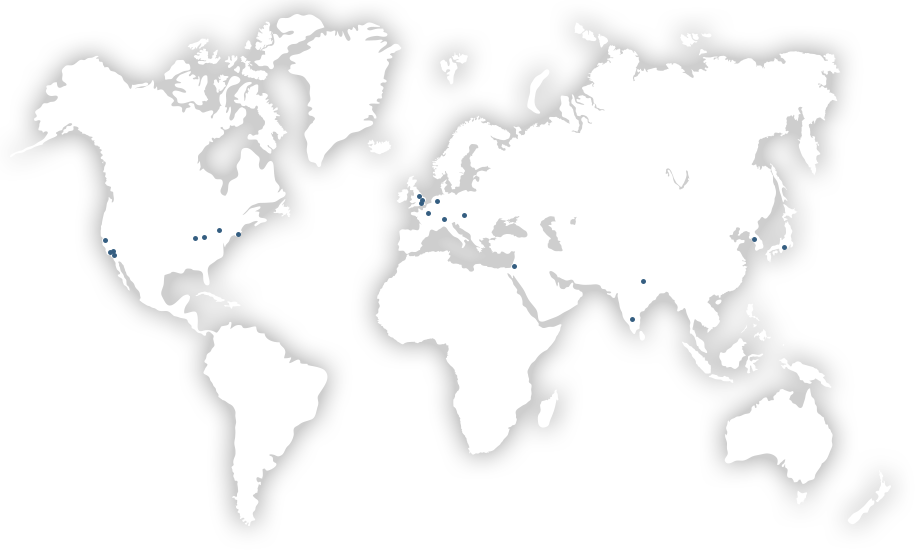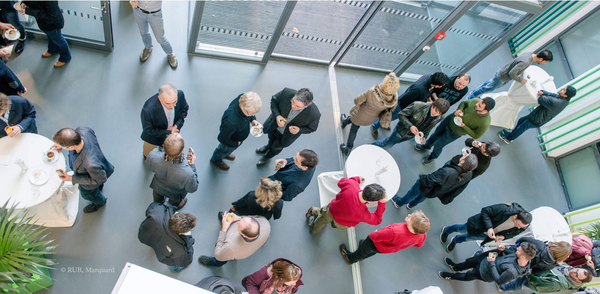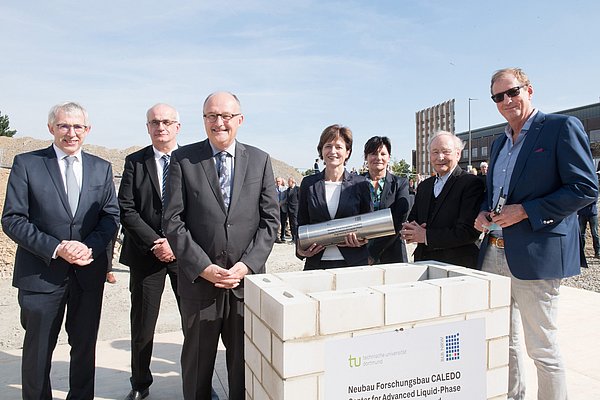
What we do, how and why
Leading solvation research
What role do solvent molecules have in phenomena like protein reactions in cells, sustainable reuse of CO2 or the origin of life? Since 2012, we mix our expertise in chemistry, physics and biology to answer these kind of questions.
We apply cutting-edge technologies like laser spectroscopy, scanning microscopy, molecular dynamics. We investigate the faintest interactions between solvent molecules, like water, and the dissolved compounds, like proteins or iron for example. Our research is essential to advance technologies that could reuse CO2 for chemicals production, increase the efficiency of energy conversion and storage, develop smart sensors, or enhance drug delivery.
RESOLV mission is to advance the global research environment of Solvation Science, to ensure the rapid transfer of research findings into key innovative technologies and to inspire the scientists of tomorrow.
RESOLV trains around 100 PhD students, collaborates with over 20 partners around the world, fosters gender equality and technology transfer.
Scientists
Who we are
200 scientists from 6 institutions in the German Ruhr Area team up in the Cluster of Excellence Ruhr Explores Solvation (RESOLV in short). The Ruhr-Universität Bochum (RUB) and the TU Dortmund University co-host the cluster. Prof. Dr. Martina Havenith from RUB is the cluster Speaker and Coordinator.
Strategic Partnerships

International Faculty
Our international network of more than 20 top institutions reaching from the US to Europe and Asia.
Partner Institute CALSOLV
California explores Solvation, our partner consortium at UC Berkeley, enables fruitful scientific exchange.
Local
Partners
Six strong institutions from the Ruhr area join forces to do excellent research on Solvation Science.

Zemos
Home of Solvation science
The research building at Ruhr university bochum
The Center of Molecular Spectroscopy and Simulation of Solvent-driven Processes (ZEMOS - short in German) is the first research building for Solvation Science in the world. Co-funded by the German Federal Government and the State of North Rhine-Westphalia, ZEMOS opened in May 2016. The four-story construction has an S shape that recalls the first letter of the main technology platforms hosted inside: spectroscopy and simulation for Solvation Science.
In ZEMOS, architecture and design come together to foster innovative and unconventional scientific thinking: In the colorful and transparent interior, national and international scientists find bright offices, shared spaces for scientific discussions, and place for large equipment.
find out more
Funding
44 MIO. €
Total Area
4000 M2
Scientists
OVER 100
Interdisciplinarity
6 DISCIPLINES

CALEDO
Application of Solvation science
The new research building at TU Dortmund University
The Center for Advanced Liquid-Phase Engineering Dortmund (CALEDO), co-funded by the German Federal Government and the State of North Rhine-Westphalia, was officially opened in October 2025. The research in CALEDO focusses on the exploration of fundamental knowledge and deep understanding of solvent effects focusing on designing liquid phases to serve as reaction media for innovative applications in chemistry and biotechnology as well as for life sciences formulations.
The core facilities in CALEDO encompasses cutting-edge equipment for NMR spectroscopy, X-ray, light-scattering techniques, mass spectrometry, an automated liquid-handling platform and reactor setups for chemical synthesis as well as GMP-compliant laboratories for pharmaceutical formulations.
Funding
70 MIO. €
Total Area
3600 M2
Scientists
OVER 100
Connecting Science &
APPLICATION
scientists
The core of RESOLV expertise comprises about 50 leaders from all partner institutions. These top researchers and their collaborators put their diverse knowledge at disposal for the following research areas:
I: Local Solvent Fluctuations in Heterogeneous Systems
II: Solvent Control of Chemical Dynamics and Reactivity
III: Solvation under Extreme Conditions







